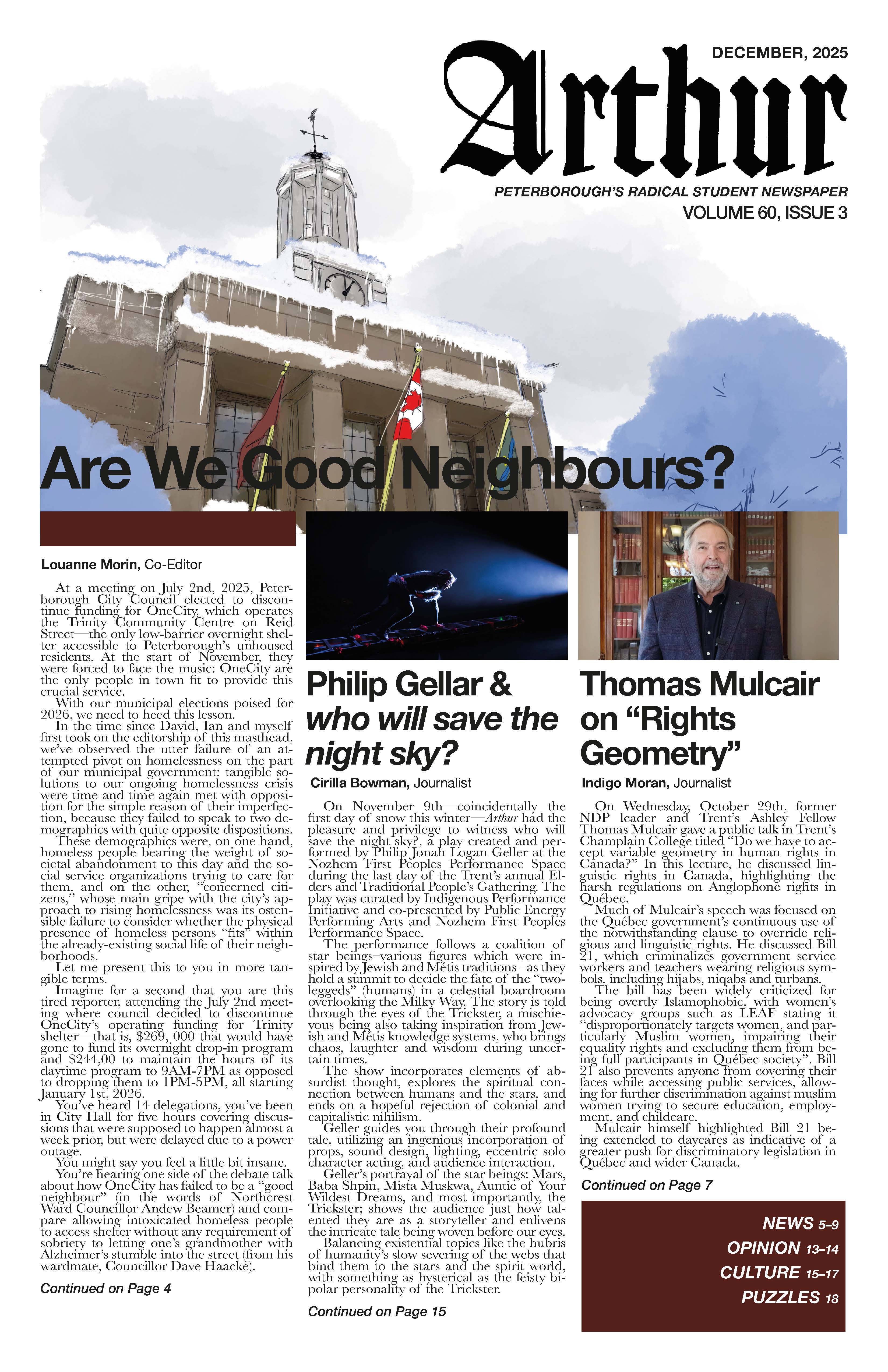Peterborough City Council voted for a final time to call on the federal and provincial governments to increase their support for college boards to prevent cuts to programs on offer. The motion comes as Fleming College’s board has voted to cut 29 programs across its two campuses. Council’s motion is meant to call particular attention to the economic impact of this decision on the City of Peterborough and the surrounding area.
Last month, the City of Kawartha Lakes Council passed a similar resolution to demonstrate the need for upper levels of government to understand how funding and policy decisions for post-secondary institutions affect local economies and workforce development strategies.
The notice of motion was brought forward by Councillor Joy Lachica during a June 17th General Committee meeting, during which Councillors voted 6-4 in support as Otonabee Ward Councillor Lesley Parnell was absent.
Of those who voted against the motion at General Committee, most cited their concerns that they did not see how this was in their purview as City Councillors, claiming that it was an issue to be worked out between university administrators and the other two levels of government.
During a discussion on the motion on June 24th, Councillor Gary Baldwin cited Parnell’s absence as among the reasons he requested the motion be pulled from the consent agenda.
In speaking to the motion himself, Baldwin focused primarily on whether or not Lachica had spoken to Fleming President, Maureen Adamson, or representatives of other neighbouring municipalities before bringing the notice of motion forward.
To this inquiry, Lachica argued that “the City of Peterborough would be remiss to not bring this forward as it impacts our specific economy.”
Lachica went on to clarify that since the notice of motion was made public in advance of the June 17th meeting she had heard from President Adamson and that the motion itself had nothing to do with directing Fleming’s Administration or Board.
In the letter, which has been obtained by Arthur, Adamson notes that she was “perplexed and disappointed” by the motion, going on to say that it is “disrespectful to the great work of the voluntary members of my board who give their time and expertise to the college and university.”
In response to an inquiry from Arthur, President Adamson reiterated her concerns about how the motion was handled.
"Management of Fleming College was not consulted nor notified by Councillor Lachica about her motion," Adamson wrote in an email sent from the College's marketing department. "It is perplexing that a municipal council would opine over detailed matters such as program/course offerings of a college that are squarely within the jurisdiction of the province."
However, Lachica, unlike some of her colleagues, was unperturbed by the post-secondary administrator’s bruised ego and seemingly intentional misreading of the motion itself which does not cast ay judgement on the decision of Adamson or the College's board.
Significantly, Lachica also relayed that she had written back to Adamson but had not received a response.
“We need to, in my opinion—as motion stands for itself—get back to what the intent of the motion is,” Lachica said. “It has nothing to do with directing anything to the President of Fleming and the board. This is an advocacy motion to the province and the federal government.”
“Stories speak volumes and I'd like to thank the delegations that came this evening to share their stories,” Lachica continued.
Among the delegations at Monday’s meeting was Jamie Molloy of the heavy equipment repair company Iron Equipment Ltd. based in Fraserville.
Molloy, a graduate of Fleming College’s Heavy Equipment Technician program, outlined his position as someone who understands the impact that Fleming decision to cut the heavy equipment and generator technician program in particular will cause.
“I see firsthand the increasing demand for skilled technicians in the industry and a shortage of qualified professionals,” Molloy said. “Iron Equipment has a history of competing with much larger competitors for the opportunity to employ such graduates from these programs.”
Following Molloy’s delegation, Councillor Baldwin asked if he had reached out to Peterborough-Kawartha MPP, David Smith, about his concerns. Molley responded that he had written to Smith over the weekend and had only received a generic email back.
Councillor Alex Bierk, who voted in support of the motion, asked Molloy to confirm whether he considered it “important for local representatives to do this work” of communicating to the feds and the province the economic impacts of these decisions at the local level.
“Absolutely,” Molloy responded. “Where else would I go but in front of you to begin to advocate for our community? This is where it has to start.”
Councillors also heard from Mark Ryckman, who is the manager of the Ontario Federation of Anglers and Hunters (OFAH)—a group which depends heavily on graduates from Fleming’s natural resource management and environmental programs, which have now been slashed.
“Unfortunately, the decision to eliminate the enforcement program which consisted entirely of domestic students, I might add, will make it even more difficult to recruit high-quality candidates,” Ryckman told Council. “Canada's biodiversity is facing increasing threats from climate change, invasive species, habitat destruction, and pollution and we are going to need more educated professionals to fill these jobs, not less, if we hope to steward our country through these crises.”
Students, too, were among those who addressed Council. Anisa Elder and Aerik Knox spoke of how Fleming provided them the opportunity to to work towards studying at the university level through Fleming’s General Arts and Science Degree Transfer program.
The pair spoke to the fact that while domestic students make up the majority of their classmates in these programs, and local students about half, international students are being blamed for the cuts in some circles.
“They're being unfairly punished for poor judgments of Fleming’s management,” Knox said. “This decision hurts us all both in the short term and long term as we've seen tonight, and something must be done to rectify the trouble that this has caused.”
Lachica added some more thoughts about the notion of whether or not Council was acting within its jurisdiction with this motion.
“If we want to talk about the word jurisdiction, what it would mean then is that I am actually taking on the role of deciding on governance,” Lachica said. “We're not doing that here. I am not the board member, you are not the board member. They are the board members and the President, that is their jurisdiction, and they make decisions; what we are, are elected representatives of a community and it is our job to be leaders.”
“It is our job to listen to our communities, to our local businesses, and to our electorate. And it is our job to be attuned to their needs,” Lachica continued. “Tonight I have sat and I have listened to stories, to narratives that have changed people's lives, and it's my job to advocate for this community; that is my jurisdiction.”
In a bizarre moment before the final vote, Mayor Leal facetiously asked Lachica if MPP Smith had reached out to her to confirm he’s looking into increasing funding for Fleming to the tune of $40M.
“Not at this time,” Lachica responded. ”Maybe he will after this letter.”
The motion passed by a final vote of 7-4 with Mayor Jeff Leal and Councillors Baldwin, Duguay, and Parnell voting against.
Councillor Matt Crowley, who last week voted against the motion because of the issues of jurisdiction outlined in Adamson's letter, admitted that he had changed his mind after speaking to several people over the past week.
The context of Crowley’s change of heart also had to do with Council’s recent decision to bring economic development in-house and his recognition of the reality that Fleming’s decision “directly impacts our economic development with the loss of the faculty and the loss of these important courses.”
Editors' note: This article has been updated to include a statement from Fleming College President Maureen Adamson which was received after the article's initial publication.


.png)


.jpg)


.jpeg)



.jpg)


.jpg)

.jpg)

.jpg)

.jpg)
.jpg)



.png)